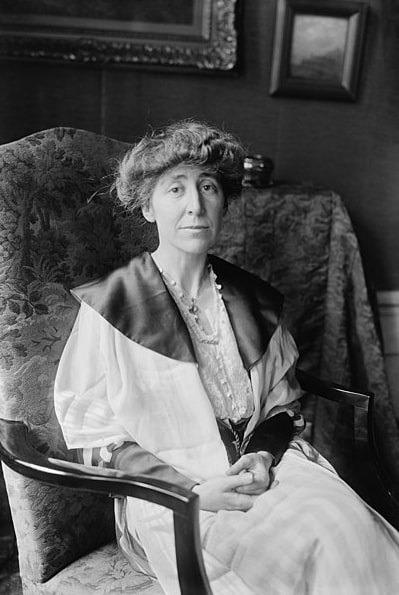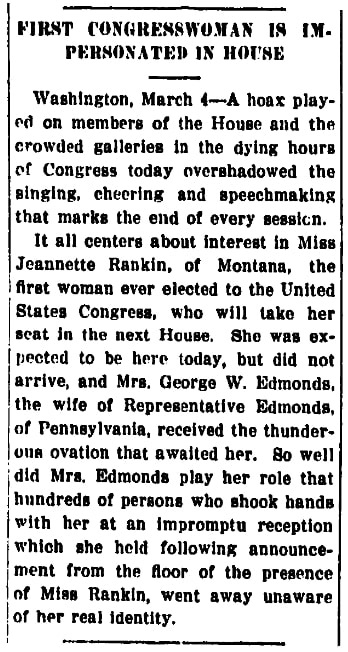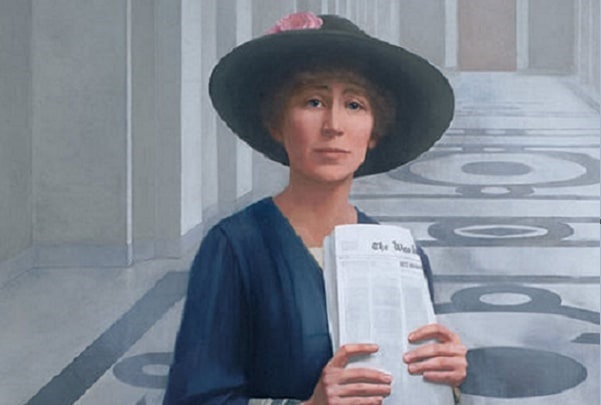In honor of March being Women’s History Month, we present the following story.
Jeannette Pickering Rankin, a suffragist and pacifist, earned the distinction of becoming the first female member of Congress when she was elected to represent Montana in the U.S. House of Representatives on 7 November 1916. She had worked hard in the successful campaign that granted women the right to vote in Montana in 1914. However, throughout her first term as a U.S. representative most women in the country could not vote (the Nineteenth Amendment giving women the right to vote nationwide was not ratified until 1920). She was a committed pacifist, and was one of 50 representatives to vote against America’s entry into World War I.

After her first term (4 March 1917 to 4 March 1919) she campaigned to represent Montana in the U.S. Senate but was not elected. In 1940, however, she was again elected to the House of Representatives, and during that term (3 January 1941 to 3 January 1943) she was the only member of Congress to vote against America’s entry into World War II, again sticking to her pacifist principles. She was so viciously vilified for that anti-war vote that she never again ran for national office.
The historical significance of a woman finally becoming a member of Congress would seem to merit celebration and serious reflection, but that does not appear to have been the case, at least not universally. On what was supposed to be her first appearance in the House of Representatives (she ended up not making it), 4 March 1917, the House instead pulled a juvenile hoax that seems beneath the dignity of this historic occasion.
Additionally, comments made in a number of newspapers seemed to belittle the importance of her achievement, as seen in the following examples.

Here is a transcription of this article:
FIRST CONGRESSWOMAN IS IMPERSONATED IN HOUSE
Washington, March 4. – A hoax played on members of the House and the crowded galleries in the dying hours of Congress today overshadowed the singing, cheering and speechmaking that marks the end of every session.
It all centers about interest in Miss Jeannette Rankin, of Montana, the first woman ever elected to the United States Congress, who will take her seat in the next house. She was expected to be here today, but did not arrive, and Mrs. George W. Edmonds, the wife of Representative Edmonds, of Pennsylvania, received the thunderous ovation that awaited her. So well did Mrs. Edmonds play her role that hundreds of persons who shook hands with her at an impromptu reception which she held following announcement from the floor of the presence of Miss Rankin, went away unaware of her real identity.
Here is a transcription of this article:
The Hon. Jeannette Rankin is one politician at Washington who will refuse to appeal to the kind regards of the plain people by wearing a slouch hat.
Here is a transcription of this article:
With Senator Saulsbury from the du Ponts’ [gunpowder manufacturers] state as president of the senate and Jeannette Rankin a leading figure in the house we should become a nation of experts on all kinds of powder.
Here is a transcription of this article:
Jeannette Rankin eats two apples every day at luncheon. Important information about Jeannette Rankin continues to develop.
Here is a transcription of this article:
Then, too, if Jeannette Rankin puts her feet on the desk as do the other congressmen there is the item of $18 shoes to consider as part of the cost of public service.
Here is a transcription of this article:
Lady from Montana.
Washington, D.C. – When asked how Miss Jeannette Rankin will be referred to in Congress, Speaker Clark said: “On the floor of the House Miss Rankin will be addressed and spoken of as the lady from Montana. In the newspapers I should say she should be spoken of as Representative Rankin. She is a representative from Montana, and most newspapers use the form of representative in referring to members in the lower house of Congress.”
Here is a transcription of this article:
MISS RANKIN HAS WASHINGTON AGOG
No Precedents for Her Political and Social Status
Lectures Here Tuesday
The election of Miss Jeannette Rankin as one of Montana’s Congressional delegation has caused a lot of speculation in Washington as to just what her social and political standing will be as a member of Congress. A thousand questions have been raised as to how her colleagues in Congress will look upon her and as to how she will get along in Washington social life.
While all of official and social Washington is wondering, Miss Rankin is plodding along in her characteristic way, and is not one whit worried about the future. She has progressed under far more perplexing conditions than those that will confront her in Washington.
Related Article:
